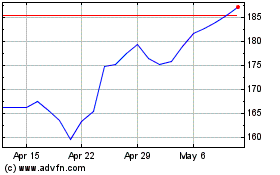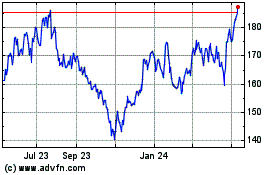Intel Corp. (INTC) warned its fourth-quarter revenue will fall
about $1 billion short of its previous guidance as shortages of
hard-disk drives are expected to hurt its core personal computer
market for the next few months.
The worst flooding in decades in Thailand dismantled or damaged
a large chunk of the world's hard-drive manufacturing operations,
causing a slowdown in PC production and the need for fewer chips by
computer makers, Intel said. The Santa Clara, Calif., company had
said it didn't expect an impact in the current period from the
flooding.
"We do expect continued shortage of [hard-disk drives] to be
pretty significant in the early part of 2012," Intel Chief
Financial Officer Stacy Smith said. "And we expect supply to catch
up to overall demand sometime in the first half of 2012. Where
exactly that happens over the course of the first half is too early
to say, but we do expect that this will catch up sometime in the
first half."
The slowdown in computer production comes as the rise of tablets
weighs on demand for PCs, and as concerns grow about the global
economy because of Europe's problems and the perception of slowing
growth in China.
Intel said Monday it now expects fourth-quarter revenue of $13.7
billion, plus or minus $300 million, down from the previous view of
$14.7 billion, plus or minus $500 million. Intel also lowered its
fourth-quarter gross margin view to 64.5%, plus or minus a couple
of percentage points, versus 65%, plus or minus a couple of
percentage points.
The news sent Intel shares down 5% to $23.76 in recent trading,
trimming some of the stock's gains from the past few months.
Despite the slide, the stock has climbed 8.2% over the past 12
months. PC chip rival Advanced Micro Devices Inc. (AMD) also traded
lower, off 4.9% to $5.27, while computer graphics chip maker Nvidia
Corp. (NVDA) slid 4.1% to $14.29. Memory chip maker Micron
Technology Inc. (MU) lost 3.5% to $5.68.
Demand for servers and PCs remains "healthy and growing," with
the guidance cut related to the supply issues, Smith said. He noted
that PC sales have played out as Intel had expected at the
beginning of the fourth quarter.
Intel said in October that demand would be below normal
seasonality, with consumer spending in mature markets remaining
weak but business spending and emerging markets demand staying
strong.
Intel on Monday said that it expects sales of personal computers
to be up sequentially in the fourth quarter, despite the flooding
and PC makers buying fewer chips. The company expects hard-disk
drive supply shortages to continue into the first quarter, followed
by a rebuilding of microprocessor inventories as supplies of
hard-disk drives recover during the first half.
"The hard-disk drive situation is going to be a little more
pervasive than people think through the first half of next year,"
Raymond James analyst Hans Mosesmann said. "This shouldn't be too
surprising, but for the next six months, we'll be in limbo."
The warning is a sharp reversal for Intel, which has been
blowing away estimates in recent quarters, helped by its server
chips. The company also has held a more optimistic view of the PC
industry because of strength in so-called "white-box" desktops in
emerging markets.
"White-box" PCs are either self-built or made by small computer
shops, as opposed to PCs produced by Hewlett-Packard Co. (HPQ),
Dell Inc. (DELL) and other computer giants. Intel Chief Executive
Paul Otellini said earlier this year that about a third of all PCs
sold in emerging markets aren't branded machines.
While many analysts expect white-box desktop manufacturers to be
hurt the most by the hard-disk drive shortage, Tom Kilroy, Intel
senior vice president and general manager of sales and marketing,
said Monday that the hard-drive shortages are "quite broad across
customer segments and geographies."
Smith, meanwhile, said the average selling price for chips
should be higher in the period as low-end PCs, which have the least
expensive chips, take the biggest hit from the hard-disk drive
shortages. He added that solid-state drives, which use flash
memory, should see an increase in demand.
Orders dropped off quickly in the past couple weeks as hard-disk
drive makers provided updates to customers on how much supply they
would receive, he said.
"As our customers have seen a customer-by-customer commitment of
supply of hard-disk drives, they started to align their backlog to
future [hard-disk drive] supply and so we saw pretty rapid
reduction of backlog over the last few weeks," Smith said.
Intel isn't cutting back on its own production, he said, but
will keep building chips on expectations that orders will rebound
in the first half of 2012.
IHS iSuppli earlier this month said the Thailand flooding will
spur a shortfall of PCs in the first quarter and cause global
computer shipments to rise only 6.8% in 2012, down from its
previous outlook for 9.5% growth.
Many tech companies--including hard drive maker Western Digital
Corp. (WDC) and component supplier Hutchinson Technology Inc.
(HTCH)--had suspended operations in Thailand as rising water
flooded their facilities. About 40% of the hard-disk drive
industry's total output originates in the country, something that
is leading to supply shortages and hurting customers such as
computer makers.
Last week, Texas Instruments Inc. (TXN) and Altera Corp. (ALTR)
cut their guidance for the fourth quarter as worries about the
broader economy led to weaker demand across most of the chip
makers' end markets.
-By Shara Tibken, Dow Jones Newswires; 212-416-2189;
shara.tibken@dowjones.com
--Lauren Pollock contributed to this article.
Texas Instruments (NASDAQ:TXN)
Historical Stock Chart
From Sep 2024 to Oct 2024

Texas Instruments (NASDAQ:TXN)
Historical Stock Chart
From Oct 2023 to Oct 2024
